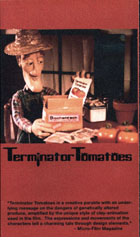
Terminator Tomatoes 2001
Distributed by The Video Project, 375 Alabama, Suite 490, San Francisco, CA 94110; 800-4-PLANET
Produced by Suzanne Twining, Intertwining Films
Directed and animated by Suzanne Twining
VHS, color, 5 min.
Jr. High - Adult
Agriculture, Bioethics, Environmental Studies, Gardening
Date Entered: 11/09/2018
Reviewed by Jo Manning, freelance librarian/researcher/writer, Miami Beach, FLThis short, animated color film is done in the claymation style popularized by Will Vinton. It’s done with 35mm color film and uses stop-motion animation (clay) puppets and miniature sets. As animation, it is very well done; the quality is excellent. It is, however, propaganda, and should be recognized as such. Not that propaganda is necessarily a bad thing, but purchasers/viewers should be aware that this is a one-sided film, an extremely effective one-sided film. The Video Project, which distributes Terminator Tomatoes, is open and up-front about its political and environmental biases. Royalties from these films go to the makers of the films. (Be sure to check their website www.videoproject.com for more on the goals of this organization.)
Terminator Tomatoes is anti-GM (genetically modified) foods. There is another quite descriptive term for GM foods: Frankenfood, after the monster created by the mad scientist Dr. Frankenstein. It’s a graphic film, and one that might not be suitable for small children. The story is this: Little Susie and her father – who is a small-time farmer – purchase tomato seeds guaranteed to produce a high-yield crop. The tomatoes grow fast, they grow big, and they look gorgeous. Little Susie notices, though, that beneficial insects that land on the tomato plants die gruesome deaths, but pests thrive and grow larger. And using an herbicide/super-grower recommended by the seed company results in huge, ugly weeds aggressively taking over the field. When Little Susie cuts open one of the luscious-looking tomatoes and takes a bite, she immediately breaks out in ugly red hives. The cost of these GM seed/herbicide is so expensive that Little Susie’s father is driven out of business. No happily ever after scenarios here!
Should libraries purchase this little film? Absolutely! Public libraries, in particular, need to show all sides of an issue, especially hot issues affecting the environment. Does this film show bias? Absolutely! Hot issues polarize. Controversy is good for discussion. This film shows the very worse things that can occur when GM plants are introduced into the environment. It is not a balanced presentation. Purchasers should be aware of this ahead of time, and that the film may not be altogether suitable for too-young, too-impressionable children. Adolescents should be able to handle it better, especially with the proper background briefing by teachers or other adults. The Study Guide delves more deeply into the bio-ethics of genetically modified foods but presents no counter-arguments for their possible value to farmers or consumers. It is a serious issue, one of the most crucial of this decade, and I think this startling little film makes its point effectively. At the very least, it will open up discussion.
Recommended